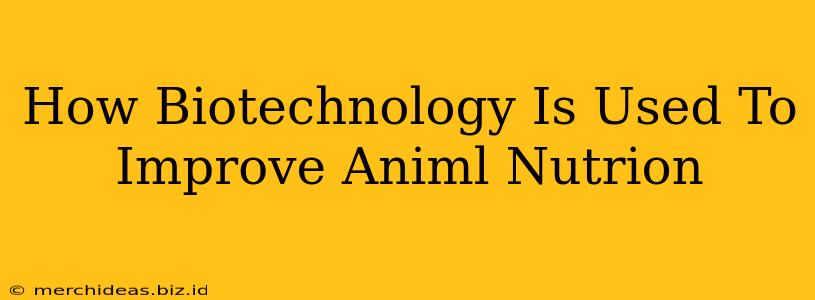Biotechnology is revolutionizing animal nutrition, offering innovative solutions to enhance feed efficiency, animal health, and overall productivity. This field leverages cutting-edge scientific techniques to improve the nutritional value of feed and optimize nutrient absorption in animals. Let's explore the key applications of biotechnology in enhancing animal nutrition.
Enhancing Feed Efficiency with Biotechnological Advancements
One of the most significant contributions of biotechnology to animal nutrition is improving feed efficiency. Traditional feed sources often contain antinutritional factors that hinder nutrient absorption. Biotechnology provides solutions to address this:
1. Enzyme Production:
- Phytase: This enzyme breaks down phytate, a compound in plant-based feeds that binds to essential minerals like phosphorus, making them unavailable to animals. Phytase supplementation significantly increases phosphorus absorption, reducing the need for supplemental phosphorus in feed formulations and minimizing environmental pollution from phosphorus excretion.
- Xylanase and Cellulase: These enzymes break down complex carbohydrates in plant cell walls, improving digestibility and energy availability from fibrous feed ingredients. This leads to better feed conversion ratios and reduced feed costs.
- Proteases: These enzymes help break down proteins into smaller, more readily absorbable peptides and amino acids, enhancing protein utilization and minimizing nitrogen excretion.
2. Genetic Modification of Feed Crops:
Genetically modified (GM) crops are engineered to enhance their nutritional content or reduce antinutritional factors. For example, GM corn and soybeans with enhanced levels of essential amino acids or reduced levels of phytic acid are available, leading to improved nutrient bioavailability for animals.
Improving Animal Health through Biotechnology
Biotechnology also plays a crucial role in enhancing animal health, which is directly linked to nutrient utilization and overall productivity.
1. Probiotics and Prebiotics:
- Probiotics: These are live microorganisms (bacteria or yeast) that, when administered in adequate amounts, confer a health benefit to the host animal. They improve gut health, enhance nutrient digestion and absorption, and strengthen the immune system, thereby improving overall animal performance.
- Prebiotics: These are non-digestible food ingredients that promote the growth of beneficial bacteria in the gut. They act as a food source for probiotics, further enhancing their positive effects on animal health and nutrition.
2. Targeted Nutrient Delivery:
Biotechnology enables the development of novel feed additives that deliver specific nutrients directly to the target tissues or organs in the animal body. This targeted approach improves nutrient utilization efficiency and reduces nutrient wastage.
3. Diagnostics and Disease Prevention:
Biotechnology-based diagnostic tools facilitate early detection of nutritional deficiencies or diseases, enabling timely intervention and improved animal health management.
Sustainable Animal Agriculture through Biotechnological Solutions
Biotechnology contributes to more sustainable animal agriculture by optimizing nutrient utilization and reducing the environmental impact of animal production. Improved feed efficiency leads to reduced feed consumption and lower greenhouse gas emissions. Minimizing nutrient excretion through improved absorption also helps reduce environmental pollution.
The Future of Biotechnology in Animal Nutrition
The field of biotechnology continues to advance rapidly, offering promising avenues for further improvements in animal nutrition. Research focuses on developing new enzymes, enhancing GM crops, optimizing probiotic formulations, and exploring new technologies for targeted nutrient delivery. These advancements promise to significantly improve animal health, productivity, and the sustainability of animal agriculture. The integration of biotechnology with other approaches, such as precision livestock farming and data analytics, will further enhance the efficiency and effectiveness of animal nutrition strategies.
